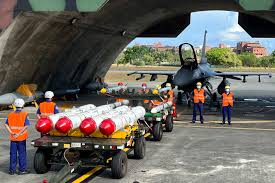In retaliation for American arms sales to Taiwan and American sanctions against Chinese individuals and firms, China slapped restrictions on five American defense-related enterprises on Sunday.
The Foreign Ministry stated in an online statement that the firms’ assets in China would be frozen and that Chinese individuals and organizations would not be allowed to do business with them.
The companies, BAE Systems Land and Armaments, Alliant Techsystems Operations, AeroVironment, Viasat, and Data Link Solutions, were not sure how the sanctions would affect them, if at all. Since American defense contractors typically don’t sell to China, these sanctions are frequently primarily symbolic.
The U.S. actions, according to the Foreign Ministry, violated the rights and interests of Chinese persons and companies, hurt China’s sovereignty and security interests, and threatened peace and stability across the Taiwan Strait.
As per the ministry statement, “the Chinese government is steadfast in its determination to preserve national sovereignty, security, and territorial integrity, as well as to defend the legitimate rights and interests of Chinese companies and citizens.”
Less than a week before Taiwan’s presidential election, which is heavily fought mostly over the government’s handling of relations with China—which claims the self-governing island as its territory and demands that it submit to its authority—an announcement was made.
The U.S. government’s approval of a $300 million military package for Taiwan in December prompted China to take countermeasures, but the Chinese Foreign Ministry did not specify which arms deal or U.S. sanctions China was responding to. Spokesman Wang Wenbin had issued a warning three weeks ago.
Equipment, instruction, and equipment maintenance are all included in the agreement to preserve Taiwan’s military communications, command, and control capabilities.
The United States declared that the deal would help Taiwan’s armed forces remain credible and modern. The Defense Security Cooperation Agency at the Pentagon released a news release stating that “the proposed sale will improve the recipient’s capability to meet current and future threats by enhancing operational readiness.”
Major tensions between the United States and China are centered on Taiwan, which observers fear could lead to a military confrontation between the two nations. China claims that the United States armament shipments to Taiwan constitute meddling in its internal affairs.
In an attempt to prevent the government of Taiwan from formally declaring independence, the Chinese military frequently sends fighter planes and ships into and over the waters surrounding the island. Although there doesn’t seem to be an impending invasion, the ongoing military action acts as a continual reminder that the threat is always there.
Although the United States moved its diplomatic recognition from Taiwan to China in 1979, it is nevertheless required by domestic law to guarantee Taiwan’s self-defense capabilities. Taiwan is divided from China by the Taiwan Strait, a 160-kilometer (100-mile) wide strait that is traversed by warships from the United States and its allies.


















